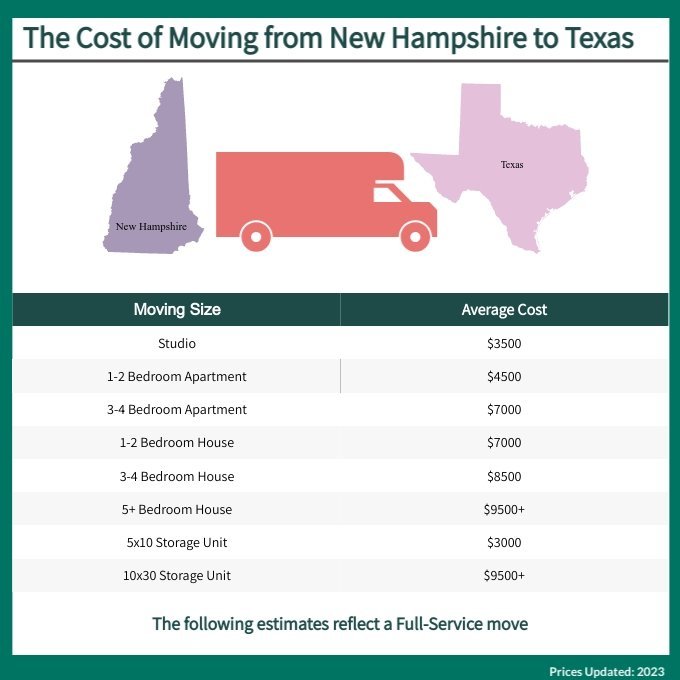September 23, 2023
The Cost: Moving from New Hampshire to Texas
The Comprehensive Guide to Moving from New Hampshire to Texas: Costs and Preparations
Moving from the picturesque landscapes of New Hampshire to the vast horizons of Texas is no small feat. Such a long-distance move involves extensive planning, logistics, and understanding the associated costs. If you’re considering this significant transition, we’re here to guide you every step of the way. Let’s dive into the intricacies of moving from the “Granite State” to the “Lone Star State.”
The cost of moving from New Hampshire to Texas can range from $3,500 to $9,500+. This figure can vary based on several factors which we will discuss below. It’s important to understand that these are ballpark figures, and the specific cost will depend on your unique circumstances and the moving company you choose. Understand the difference between binding and non-binding estimates to ensure your move doesn’t go over budget.

Preparing for the Big Move
The cost of moving from New Hampshire to Texas can vary based on several factors:
Distance: The average distance between New Hampshire and Texas is approximately 1,800 to 2,500 miles, depending on your exact locations. Most moving companies charge based on weight and distance.
Volume and Weight of Belongings: The more stuff you have, the more it will cost. Downsizing or decluttering can significantly reduce your expenses.
Specialty Items: Items like pianos, antique furniture, or large artwork might require special handling, increasing the overall cost.
Packing Services: If you decide to use professional packing services – like the ones we proudly offer at MMB Movers – this will be an additional charge. However, it guarantees your belongings are packed securely for the long journey.
Storage Solutions: There might be a gap between when you leave New Hampshire and when you can move into your new Texas home. If so, you’ll need storage services.
Insurance and Valuation: It’s essential to ensure your belongings for a long-distance move. While most moving companies offer basic liability coverage, consider full value protection for peace of mind.
To get a precise estimate tailored to your move, consult with professional movers, like us at MMB Movers, who specialize in long-distance transitions.
The Importance of Choosing a Reputable Moving Company
When embarking on an interstate move, one of the most crucial decisions you’ll make is selecting the right moving company. Your belongings aren’t just material possessions; they’re memories, investments, and personal treasures. Here’s why it’s paramount to choose a reputable mover and what to look out for:
Why a Trusted Moving Company Matters:
Safety: Reputable movers are trained in the best practices for safely packing, loading, and transporting your belongings, ensuring they arrive in pristine condition.
Reliability: Reliable moving companies honor their commitments. They show up on time, deliver as promised, and maintain open communication throughout the process.
Peace of Mind: Knowing you’re in professional hands can alleviate much of the stress associated with moving. You can rest easy knowing experts are managing the intricate details.
Insurance and Liability: Trusted movers offer comprehensive insurance options, ensuring that if something unforeseen does happen, you’re covered.
Cost-Efficiency: A reputable mover provides transparent quotes without hidden fees. Although they might not always be the cheapest option, they often save you money in the long run by preventing damages or costly mistakes.
Red Flags to Avoid:
Too Good to Be True Pricing: Extremely low estimates can be a sign of a scam. Beware of companies that offer a much lower rate than others; they might hike prices later or provide subpar services.
No Physical Address or Licensing Info: Any trustworthy moving company should have a physical address and valid licensing, such as a USDOT number for interstate movers. If this information is missing or vague, think twice.
Large Upfront Deposits: While it’s common for moving companies to require a deposit, be wary of those asking for large amounts upfront or only accepting cash.
Over-the-phone Estimates: A reliable mover will want to assess your belongings in person or via a virtual survey to provide an accurate estimate. Avoid companies that give quotes without seeing your items.
Bad Reviews or No Reviews: Always check online reviews on platforms like Google, Yelp, or the Better Business Bureau. While every company may have a few negative reviews, consistent patterns of complaints are a significant warning sign.
Generic Company Names: Some disreputable movers operate under generic names to avoid being tracked or held accountable. Always seek specifics and verify their credentials.
Lack of Professionalism: If a company lacks branded trucks, professional uniforms, or official documentation, they may not be a legitimate business.
In conclusion, moving from New Hampshire to Texas is a grand adventure, and while it may seem daunting, the right preparation can make it smooth and stress-free. Whether it’s understanding the “cost of moving” or ensuring your beloved possessions reach safely, the key lies in meticulous planning and partnering with trusted moving experts. Your moving experience hinges largely on the company you choose. While price is a factor, the reliability, trustworthiness, and professionalism of your chosen movers are just as crucial. As with any significant decision, it’s essential to do your homework, trust your instincts, and ensure you’re partnering with a mover who has your best interests at heart. At MMB Movers, we’re committed to making your interstate move a seamless experience. Reach out to us today to start your journey to the Lone Star State!
The Full-Service Moving Experience Timeline
Moving companies have different ways to break down pricing when it comes to full-service moves. Remember to shop around to get multiple quotes to compare. Make sure to understand the difference between a Binding and a Non-Binding Estimate. Be wary of non-binding estimates, they rarely reflect the final price you will end up paying.
